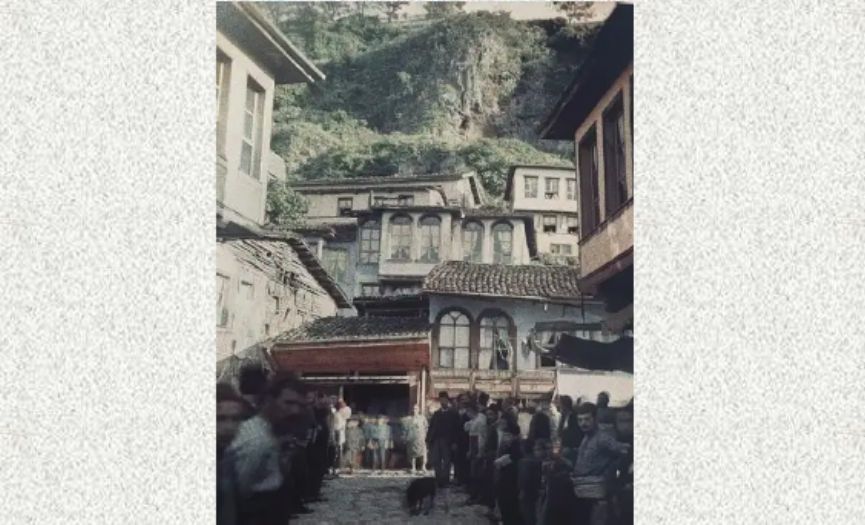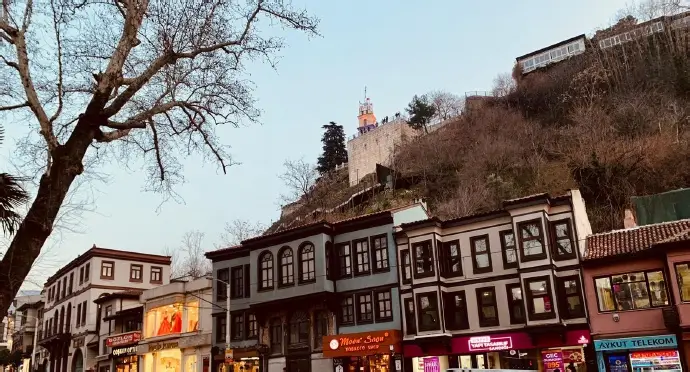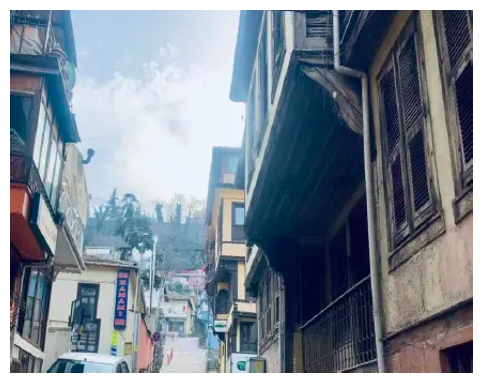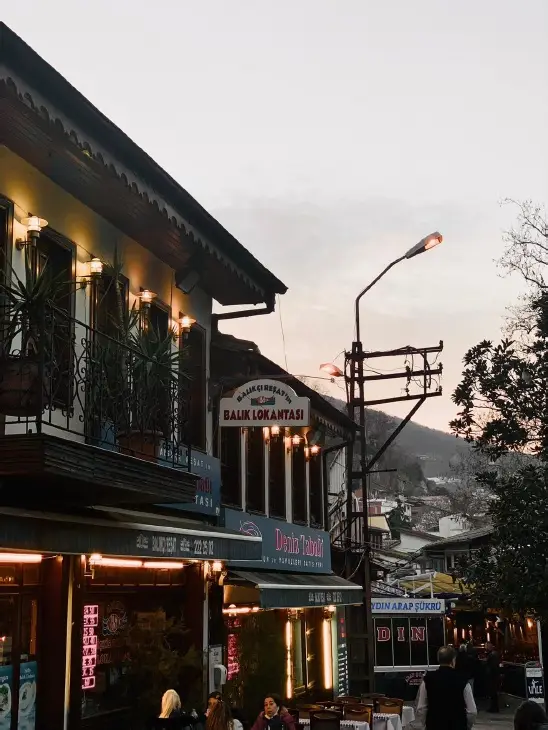
In Search of a Neighborhood Adventure: Bursa Jewish Neighborhood

By Agah Enes Yasa
Once upon a time, a fortress was built on the huge rock spread out on the northern slopes of Mount Olympus, dominating the whole plain, and a city surrounded that fortress. In the north shadow of that castle, there was a neighborhood known as Kuruçeşme, where houses with bay windows were sheltered and many people, both the rich and the poor, lived together. The young and old would meet at Shabbat tables; women used to have conversations when they visited neighbors. I think of these while walking around a street that has hosted Bursa residents for nearly two hundred years, where the sounds of clarinet and darbuka mix with the sounds of water and ice added to the raki. I stare at the Mayor Synagogue, whose door is tightly locked in front of me… Massage parlors1, the unemployed filling the teahouses, the warehouses rented cheaply by the shops, the shops on the street in Altıparmak, the smudged facade of the concrete apartment building from the 70s, and the outdated armchair that was thrown at its door. All of them lead me to pursue a centuries-old adventure…

The Formation Process of Kuruçeşme Neighborhood
After Bursa was conquered by Orhan Bey in 1326, the Hisar, which formed the center of the city, was blended with Islamic elements and became the center of the Principality. In this process, the non-Muslims who came out of the Hisar established clusters of neighborhoods on the city's periphery. Although it is a controversial issue, if we accept that they have been residents of Bursa since Byzantium, the Jews also moved to the northern and northwestern outskirts of the Hisar.
Afterward, with the acceptance of Beyazid II, Sephardic Jews, who started to settle in almost every part of Anatolia, became involved with trade, and added Bursa to their route. With the gradual arrival of the Sephardic people, Kuruçeşme became a large neighborhood in the center of Bursa. We get this information by looking at the 117 households registered in 1530 to the 403 families by the end of the sixteenth century. Moreover, in the Early Modern Era, Bursa’s Jewish neighborhood was quite different from the ghettos in European cities. It had a hammam, a fountain with clean water, and a bazaar where even Muslims would come to shop. The state, as an Islamic stance, protected non-Muslims and in return, received some additional taxes from them. The justice mechanism also worked equally between most Muslims and non-Muslims. However, the situation in society was different. The non-Muslim could be the subject to all kinds of blasphemy. When a non-Muslim was accused of committing a crime, it was possible to encounter the following: "...he/she was a Jew, he/she certainly did it!"
Eremya Çelebi talks about the rooms next to Jewish houses in Kasımpaşa in her book History of Istanbul, which we are all familiar with. In these rooms positioned towards the sea, he talks in detail about Misket Arak, that is, raki, which is sold by the Jews, as well as fish, pickles, and many appetizers. The Jews in Kuruçeşme, like the Jews in Kasımpaşa, had established taverns in a part of their house decades before Eremya Çelebi's narrative. We see this at a trial in 1571. Someone called Vakfı had sent the complaint to the Divan. In the Divan, the judge of Bursa ordered, "The taverns between Mahallat (neighborhoods) must be completely removed; one must not open a tavern." Nevertheless, the period was the reign of Selim II, and the taverns were still operating in Istanbul.
I do not know if history repeats itself, but I made verbal research with the locals to write this article. Almost all of them complained about taverns in Arap Şükrü. Especially the headman was constantly petitioning for the abolition of the taverns. Who knows, maybe if the books were examined, other sensitive people complaining like Vakfı would be found. On the other hand, I can perhaps assert that there is always a constant customer in a place with a tavern.

Jews get Going; Transformation Begins
As in other cities of Turkey, Jews in Bursa gradually left Kuruçeşme with immigration starting in the 50s. Over time, the rest were dispersed to different parts of Bursa. Those who went either preferred to sell their immovables themselves or transferred them to the Foundation of Turkish Jews. Instead of the estates they have sold, ugly apartments with journeyman's work now lean their backs on the slopes of Hisar.
Bursa did not experience any unfortunate incidents during September 6-7, since the Greeks in the city were taken to safety in a hotel by the decision of the Governor's Office, when we were all faced with the realities seen in the second season of the Club2.
Perhaps the fact that the Jews of Bursa’s having known this place as their homeland for many years, may have been caused by the lack of hatred that would trigger immigration, when we all faced it. However, Bursa Mayor Synagogue has been guarded by the police since the Al-Qaeda attacks in 2003. The Bursa Jewish Community, after performing their Saturday morning rituals and eating and drinking collectively, leave the Synagogue without being seen. They refused the interview [when I inquired], citing various security reasons. Well, sometimes people get tired of talking about the same things.
A Love Story in the Dilemma of Migration - Survival
Now I will tell you about one of the thousands of non-Muslim love stories. This is the love story of a village girl from Bursa and a Jewish man called Şaban by the people around him whose real name was Sebatay. Sebatay was a merchant who sold barrels to almost every factory in Bursa with his Muslim partner and is also a popular figure in the Jewish community in Bursa. We do not know much about the girl. Sebatay fell in love with her, when they met. However, neither her mother nor the members of the congregation accepted his marriage to a Muslim, so, he could not even attempt to ask for the hand of the girl. Neither Sebatay got married nor did the girl. They died with the love buried inside themselves, like hundreds of other love stories ending as such.
Bursa's Never-Silent Entertainment: Arap Şükrü Street
When you walk through the Street of Altıparmak from Şehreküstü, you will see the “Balıkçı Reşat" sign; here is the Jewish Bazaar, now Street of Arap Şükrü. While some of the taverns on the street are owned by the operators, some of them belong to the Jews who had emigrated from here and are protected by the Foundation of the Turkish Jews. Balıkçı Reşat and his father, Fazlı, were the pioneers in the transfer of the taverns on this street to the Turks [Muslims]. I talk with his son Nejat Bey, standing up, while he cuts the sardines that have just arrived from Mudanya into large and small sizes:
“First my father opened the tavern here, it has not been a year or two, and he sold it to Arap Şükrü. Then his name evolved from there. The Jews in the neighborhood loved fish very much, I remember; they used to buy it from my father when I was little… They loved carp and fish. First Jews ran taverns, but my Turkish [Muslim] father opened the first tavern... What was his name, Vitali, had a place; he went to Israel fifty years ago. There was also Liya, the winemaker, who bought and sold wine from Misi Village3. I opened this restaurant years later, but without alcohol. In the past, there used to be pancakes in that corner; people used to carry the completely drunk ones. There used to be a sycamore-tree coffee shop in front of this shop, and those who were too drunk would sober up there. It was demolished, and a small pool was built. Now it is gone."

How happy I was to hear, all at once, the information that I had searched for months and was not able to find. I was moving forward. I enter the Çetin Restaurant at the beginning of the street known as Arap Şükrü. Mustafa Bey, the manager of the place I meet there, welcomes me with hospitality. While I am checking the white tablecloths, plates, and cutlery arrangement prepared for the customers in the evening, I sip my tea and he begins to explain:
“The fisherman Reşat is selling this shop to Arap Şükrü. Şükrü was a sergeant in the War of Independence. He opened his first place in Ayvalık in the 1920s. He could not hold on there; So he migrates to Bursa. When he dies, his children have an inheritance issue; they cannot share the shop. Of course, he was doing a lot of work in the shop then. Look, someone is opening this shop (The sign says 'Arab Şükrü Yılmaz'). But this is the main shop. Then those who see the bustle of this place open it along the street. Two generations after Çetin Değişmez, his business was passed on to me. I have been working here since 1997. In the past, many customers came from Greece, Bulgaria, and even England; they have stopped coming since 2015, and now Arab tourists come to drink. When Atatürk came to open the Merinos Factories in the 1930s, he had visited this shop, and his memory still remains in this shop, which was a little brewery then."
We learn from the interview with Arap Şükrü's son Çetin Değişmez that, at the time that Şar Club run by Arap Şükrü before he had bought his tavern, used to be a fantastic place. That's why he refrains from drinking at work; when he closes his shop, he jumps on a carriage and follows the path of true Kuruçeşme. Upon the insistence of his friends, he had rented this shop, a coal mine at that time, and opened a tavern here. Yılmaz Değişmez, the son of Arap Şükrü, was a close follower of the taverns in Istanbul. He would go to Istanbul and take back the eating and drinking style he saw there to his own shop. After the 1960s, we can talk about a transformation in Bursa taverns, according to Istanbul etiquette.
Arab Şükrü cannot be compared with Tatavla or Asmalımescit. Because that is Istanbul, this is Bursa. This is the only place in Bursa with a centuries-old history. It's special as it is.
Of course, there was also a tavern culture in the Armenian Neighborhood of Setbaşı, on the eastern side of the city, which has not survived.
I tried to explain the approximately five hundred years of the adventure of the Kuruçeşme Neighborhood by bringing together limited and fragmented resources. The streets, and the people inside the houses, are changing, as in the song I love by Mabel Matiz, "Prayers change"4, prayers are changing. Domes, minarets, and towers are changing; and transforming by being ground in the terrible wheels of time. The current residents of Kuruçeşme do not remember anything about its former residents; they are even surprised at the questions I ask. So in this world where we will all be wiped out, what other way is there than to live for ourselves? Now it's fasıl5 time in Arap Şükrü, you can enjoy the taste of music through my lines...
1Since brothels are legally closed in Turkey, massage parlors are often perceived as inappropriate places by society, and it is possible to see news about many illegal activities in the press.
2Netflix Turkey's series that focuses on the deterioration of the cosmopolitan structure of Istanbul.
3It is a very cute village close to the Bursa city center and on the Uludağ road. If you happen to be in Bursa, stop by and enjoy!
4https://www.youtube.com/watch?v=CS-JPAad9g0
5Performing similar songs by two or three instruments and at least one vocal team.
Related News













